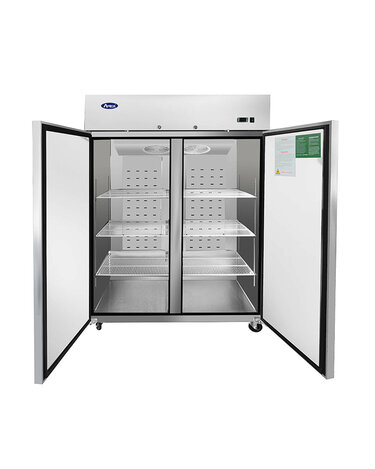The intricate dynamics of our global food supply chain underscore the critical role of commercial refrigeration in ensuring food safety and preservation. This detailed exploration delves into the multifaceted aspects of commercial refrigeration, examining its essential role in the food industry, its impact on maintaining food quality and safety, and the innovative technological advancements that are shaping its future.
Commercial refrigeration involves a variety of cooling systems and equipment designed to store and preserve food products at optimal temperatures in commercial environments. These settings include restaurants, supermarkets, and food processing plants. The equipment ranges from large walk-in coolers to specialized refrigerated display cases, each tailored to specific storage needs.
Over the years, refrigeration technology has evolved significantly. From simple iceboxes to sophisticated, digitally-controlled systems, the journey of refrigeration technology reflects the growing demands of the food industry and the need for more efficient and reliable storage solutions.
Today, commercial refrigeration is a cornerstone of the global food industry. Its applications span across various sectors, ensuring that a wide array of food products are kept in optimal conditions, from farm to table, thus playing a crucial role in the food supply chain.
One of the primary benefits of commercial refrigeration is its ability to significantly extend the shelf life of perishable goods. By maintaining consistent low temperatures, refrigeration slows down the growth of bacteria and other microorganisms, thereby prolonging the freshness and usability of food products.
Proper refrigeration is essential in preventing foodborne illnesses. It ensures that food is stored at safe temperatures, reducing the risk of bacterial growth that can lead to food poisoning. This aspect of refrigeration is particularly crucial in commercial settings where large quantities of food are handled.
Besides safety, refrigeration helps in preserving the texture, flavor, and nutritional value of food. This is essential for consumer satisfaction and health, as it ensures that the food retains its desired qualities from storage to consumption.
With growing environmental concerns, the refrigeration industry is shifting towards the use of refrigerants with lower Global Warming Potential (GWP). This move is aimed at reducing the carbon footprint of refrigeration systems and contributing to a more sustainable future.
Modern refrigeration systems are designed to be more energy-efficient. This not only reduces operational costs but also minimizes the environmental impact of these systems. Energy-efficient models are becoming the standard in the industry, driven by both regulatory requirements and consumer demand.
The integration of IoT (Internet of Things) technology in commercial refrigeration allows for real-time monitoring and control. This advancement ensures optimal performance, energy efficiency, and provides early warnings of potential issues, thereby preventing food spoilage and loss.

In the food service industry, refrigeration plays a critical role in ensuring that ingredients are stored safely and meals are prepared with fresh products. This not only impacts the quality of the food served but also the reputation and compliance of the establishment with food safety regulations.
Supermarkets rely heavily on commercial refrigeration to keep a wide range of products fresh, from produce to dairy, meats, and frozen goods. Efficient refrigeration systems are essential for maintaining product quality, reducing waste, and meeting consumer expectations for fresh and safe food.
At the processing and distribution level, refrigeration is key in preserving the quality and safety of food as it travels from producers to retailers. This includes transportation refrigeration systems that ensure food remains at safe temperatures during transit.
One of the primary challenges of commercial refrigeration is its high energy consumption. Refrigeration systems are typically one of the largest energy consumers in food-related businesses, leading to high operational costs and environmental impact.
The use of certain refrigerants has raised environmental concerns, particularly regarding their contribution to global warming and ozone depletion. The industry is under pressure to find more sustainable alternatives that are both effective and environmentally friendly.
Regular maintenance is crucial for the efficient operation of refrigeration systems. Neglecting maintenance can lead to decreased efficiency, higher energy costs, and potential food safety risks due to inconsistent temperatures.
Consistent maintenance and timely repairs are vital for ensuring the efficient operation of refrigeration systems. This includes regular cleaning, checking for leaks, and ensuring that all components are functioning correctly.
Embracing green technologies and energy-efficient designs is key to mitigating the environmental impact of refrigeration systems. This includes the use of eco-friendly refrigerants and investing in energy-efficient models.
Educating staff on the proper use and maintenance of refrigeration equipment is essential for its longevity and effectiveness. Proper training ensures that the systems are used optimally and maintained regularly, preventing breakdowns and food safety issues.
The future of commercial refrigeration is likely to see continued innovations, particularly in the areas of energy efficiency and sustainability. Advances in technology will lead to smarter, more efficient systems that can adapt to varying conditions and demands.
Regulatory changes are expected to play a significant role in shaping the future of commercial refrigeration. Stricter regulations regarding energy efficiency and refrigerant use will drive innovation and adoption of greener technologies.
Artificial Intelligence (AI) and the Internet of Things (IoT) are set to transform commercial refrigeration. These technologies will enable more precise control, predictive maintenance, and efficient operation, leading to reduced costs and improved food safety.
The role of commercial refrigeration in ensuring food safety and quality cannot be overstated. It is a fundamental component of the modern food industry, playing a critical role in every step of the food supply chain.
By extending the shelf life of food products and maintaining their quality, refrigeration systems play a significant role in reducing food waste. This is not only beneficial for businesses but also for the environment and global food security.
As the industry continues to evolve, the focus on sustainability and efficiency will become increasingly important. The future of commercial refrigeration lies in its ability to adapt to these challenges, ensuring that it continues to play a vital role in our food system while minimizing its environmental impact.